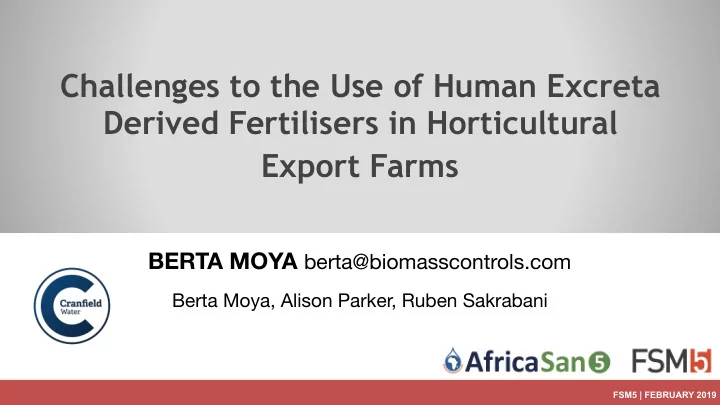

Challenges to the Use of Human Excreta Derived Fertilisers in Horticultural Export Farms BERTA MOYA berta@biomasscontrols.com Berta Moya, Alison Parker, Ruben Sakrabani FSM5 | FEBRUARY 2019
Presentation outline ● What are the barriers to wide-scale adoption of FS compost? ● The case of horticultural exports in Kenya: what are the barriers to FS compost use in this sector? ● Does FS compost application to soil introduce contaminants? ● The value of assurance schemes for increasing customer confidence. FSM5 | FEBRUARY 2019
Challenges to creating value and recovering costs from FS treatment ● Soil amendments from FS help reverse the trend of cities as nutrient sinks and improve soil health. ● Currently most FS compost producers cannot recover treatment costs from sales. ● How to increase FS compost use and its commercially viability ? FSM5 | FEBRUARY 2019
Who will pay for compost? ● Smallholder farmers have limited purchase power ● Most likely customers for compost? – NGOs or municipalities, mainly for landscaping or reforestation – Larger farms generally have higher investment capacity ● Exporting farmers are an attractive customer segment for FS compost FSM5 | FEBRUARY 2019
Vegetable exports from Sub-Saharan Africa to Europe ● Ivory Coast, South Africa and Kenya make up 90% of SSA’s food exports ● Kenya is the largest horticultural exporter to the EU in SSA ● Horticultural exports in Kenya make up 70% of the country’s horticultural earnings FSM5 | FEBRUARY 2019
Key players in the horticultural export chain FSM5 | FEBRUARY 2019
Global GAP standard and FS-derived products ● Global GAP standard: - a prerequisite for food export markets, developed by a consortium of supermarket chains - specifies fertiliser and pesticide practices in detail ● “No human sewage sludge can be used on accredited fields” (Global GAP , 2011) ● Perception that not enough is known about the effect of FS compost on crops and soil FSM5 | FEBRUARY 2019
Farmers’ needs and perceptions ● Produce grown for export often not easily absorbed into the local market ● Passing Global GAP inspections is key ● Challenges to increased productivity: ○ Climate change (reduced water availability, increasing pests) ○ Produce waste at farm level due to cosmetic standards ○ Decaying soil health ○ Increasing price of farm inputs but no increase of produce value ● All interviewed producers willing to try FS compost but wouldn’t take the risk unless Global GAP approves it FSM5 | FEBRUARY 2019
Testing the effect of FS compost on soils: Research Methodology Soil samples from farms using FS compost: samples collected from field sections that used FS compost and sections that had never received FS compost Soil samples analysed for: ● The presence of C. perfringens (ISO7937), taken as indicator of faecal contamination ● Presence of heavy metals (ISO11466) FSM5 | FEBRUARY 2019
Testing the effect of FS compost on soils: Results ● No Clostridium perfringens detected in any soil sample ● Heavy metals in soils: Concentration in soil Concentration in soil p value from t- EU concentration limits without FS compost treated with FS compost test in soil (ppm) Heavy metal (ppm) (ppm) Arsenic 1.58 1.63 0.92 5 Cadmium 0.83 0.80 0.50 1 Copper 9.76 9.92 0.91 100 Nickel 11.75 12.40 0.52 50 Lead 14.62 14.27 0.84 60 Zinc 100.17 93.87 0.61 200 Table 1 Heavy metal concentration in soils tested compared with regulatory limits (a) limits taken from the Finnish ministry of environment, representing mean values of European limits FSM5 | FEBRUARY 2019
The need for quality assurance of FS compost • Market requirements for larger producers: certifications and standards • Assurance schemes exist for biosolids in many countries: – Biosolids Assurance Scheme (BAS) in the UK – ReVAQ in Sweden – National Biosolids Partnership (NBP) in the USA – Australasian Biosolids Partnership (ABP) in Australia and New Zealand • Next, a scheme for compost from On-Site Sanitation systems? FSM5 | FEBRUARY 2019
Final thoughts and conclusions Safe compost can be made from FS but assurance schemes are needed ● to increase customers and regulators’ confidence in this type of fertiliser ● Policy and regulation play a key role in enabling or creating a barrier to the commercialisation of novel bioproducts : supporting policies and incentives needed to create a circular economy ● New value systems are needed to create a ‘level playing field’ between conventional and environment-positive solutions FSM5 | FEBRUARY 2019
Thank you! Contact: berta@biomasscontrols.com Acknowledgements: Sanergy | FPEAK | Assured Biosolids UK | Biomass Controls FSM5 | FEBRUARY 2019
Recommend
More recommend